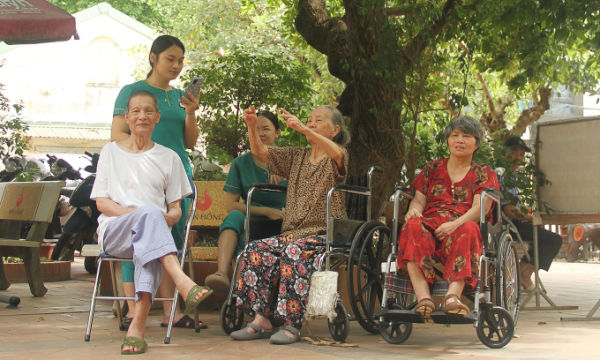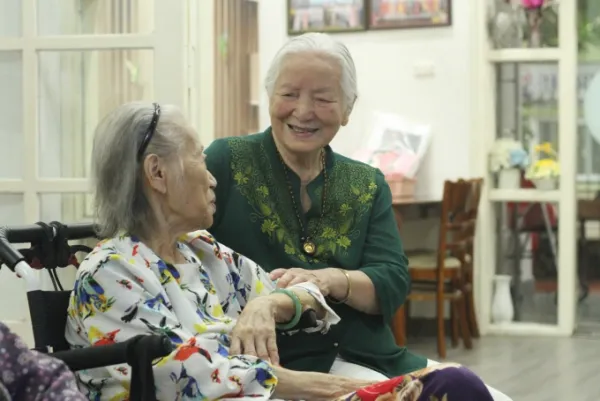
Behind a half-closed door, a frail old woman pounded her feet against the mattress, muttering curses under her breath. On three beds nearby, others lay still, eyes wide open, quietly enduring it all.
One floor up, the scene was different. At a nurse’s call, a group of elders shuffled out to the dining room for afternoon snacks. Laughter and chatter filled the hallway, and the scene was cheerful and lively like in a kindergarten class.
The top floor, reserved for VIPs, felt like another world. Each room hosted only one to three people and had a TV, fridge, private bathroom, and a window that opened to sunlight and a pleasant view. Most residents there were still alert, living a life that resembled a holiday retreat.
“Each stair in a retirement home leads to a different slice of old age,” Tran Thi Thuy Nga, a social work expert and deputy director of a northern nursing home system says. “A reirement home is a miniature society with its own hidden corners and not every senior can easily adapt to it.”
|
Elderly residents sunbathe and do light exercises at a retirement home in Hoang Mai District, Hanoi, in September 2025. Photo by Read/ Phan Duong |
After living for a year at the Hoang Mai assisted care facility, Thuy Ha, 88, says she enjoys the food, the daily routine and the company of peers and young caregivers, a big change from her lonely days of living with a helper. “But communal life can be hard.”
Her four-bedroom shared space includes a woman showing signs of Alzheimer’s who hates physical contact and reacts violently during bath time. Her favorite habit is playing with water and often locks herself in the restroom and turns on the tap for hours.
Ha says: “We’ve complained many times. The staff told her, even locked the faucet, but she keeps doing it.”
The others asked to move her to the dementia care area, but her family refused. At another home in Tay Ho District, Dang Thi Ngoc Bao, 93, recalls her first week as a “shock.” “Seniors argued over seats at meals. Sometimes one person coughed and the whole room joined in, like an orchestra.”
She once shared a room with a very “strong-willed” woman who demanded the lights be put out by 8 p.m. and assigned chores such as turning on the fan, drawing curtains and adjusting the air conditioner.
One evening Bao came back late after helping others use the elevator and was scolded: “Where have you been? It’s boiling in here!”
These anecdotes show that conflict and adaptation are arguably the biggest “hidden corners” for seniors at retirement homes that Nga refers to. Many must learn how to live with strangers after decades of family life, a challenge that seems small but causes increasing anxiety with age.
Social workers and caregivers now play dual roles: caring for bodies and mending emotions as well as listening, mediating, and restoring dignity. Beyond daily tensions, differences in wealth and affection create quieter divides: some come with solid finances, others rely on insubstantial pensions or children’s savings.
The costs range from VND8 million to 30 million a month. Nga, who has been in the field for over 10 years, has seen many seniors wanting to stay but being taken home because their families couldn’t afford the cost.
Some facilities like Thien Duc, Dien Hong and Tam Phuc now support those who run out of funds during the course of their stay. Among them is 82-year-old Le Ha, who lives in a center in Xuan Mai Town.
Once well-off, she lost everything after her only son squandered away the family fortune. With nowhere to go, she came to the retirement home, but when its prices rose, her five-million-dong pension was no longer enough.
“Worry hung over me like a pall,” she says. “I even thought about renting a cheap room with students just to have someone to talk to and help when I fall ill.”
Luckily, her center opened a more affordable branch outside the city and reduced her fee. For two years now she has lived in peace in a new, Japan-standard facility surrounded by trees and friendly neighbors.
Some, like Nguyen Thi Hoan, 82, in Linh Nam, are financially comfortable but emotionally lonely.
Divorced for years, with two children living in the Czech Republic, she once hoped to spend her final days abroad. But after a stroke and legal complications, she had to return to Vietnam.
Though relatives visit and her children call, she still feels a quiet ache. “Of course I worry,” she says softly, eyes moist. “I’m getting weaker, and my children are so far away.”
According to Nga, bridging these emotional and financial gaps requires a humane, respectful environment – one that values each elder’s life story and experience, not just their fees or health status. Regular social activities help, but family and friends remains irreplaceable, she says. “Some families rarely visit because of distance or busy schedules. We call to remind them.”
Another issue is losing self-worth. More than half of nursing-home residents can no longer care for themselves. Many still hold the belief that “in youth we rely on parents, in old age on children.” Moving into a home often feels like abandonment.
Nguyen Tuan Ngoc, founder of Vietnam’s first private nursing home, recalls that 10–20 years ago, people viewed sending parents to such facilities as unfilial. “Now, with smaller families, children working far away, and longer lifespans, people see it more practically.”
 |
|
Ngoc Bao, 93 (right), chats with another resident at an assisted care facility in Hanoi, in late September 2025. Photo by Read/ Phan Duong |
Nevertheless, acceptance is often resignation and not fulfillment. For Bao, that realization came after the loss of her only son to cancer in 2023.
Grieving deeply, she once saw a program about seniors living happily in care centers, and it inspired her to give it a shot.
There, surrounded by others’ hardships, she says she found perspective. “I’ve had two breast surgeries and three brain operations after falls, but I’m still lucid. Seeing others less fortunate, I feel grateful.”
Gradually, she discovered purpose again. She says with a smiled: “A bottle of medicated oil, a walking stick, a simple greeting, or holding someone’s hand down the stairs, those small acts comfort us.”
The center seems to have steadily grown warmer since her arrival, with even a reclusive lady from the VIP floor now coming downstairs to socialize.
After two years Bao feels she has gained more than she has lost. Her family often takes her home, but she always returns after a few days to what she calls “my real home.” “Now I feel valuable,” the 93-year-old says, “even in a place many think is just the last stop of life.”